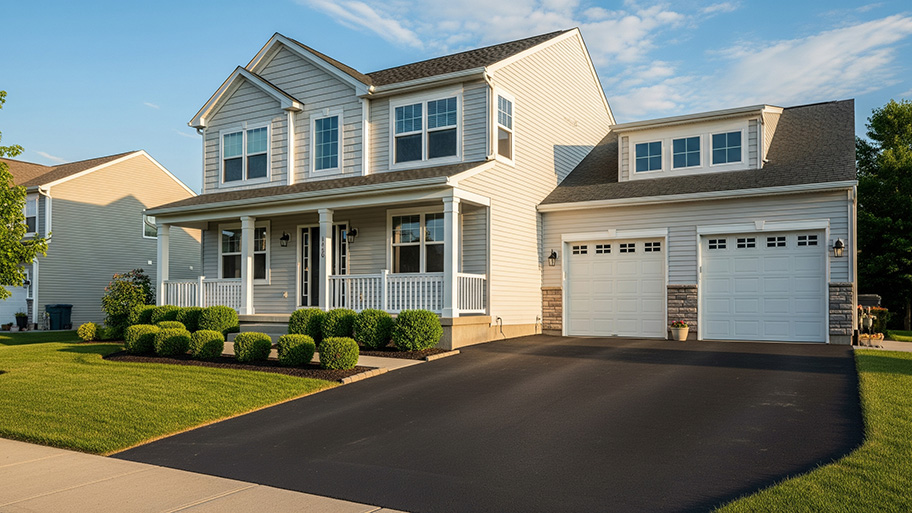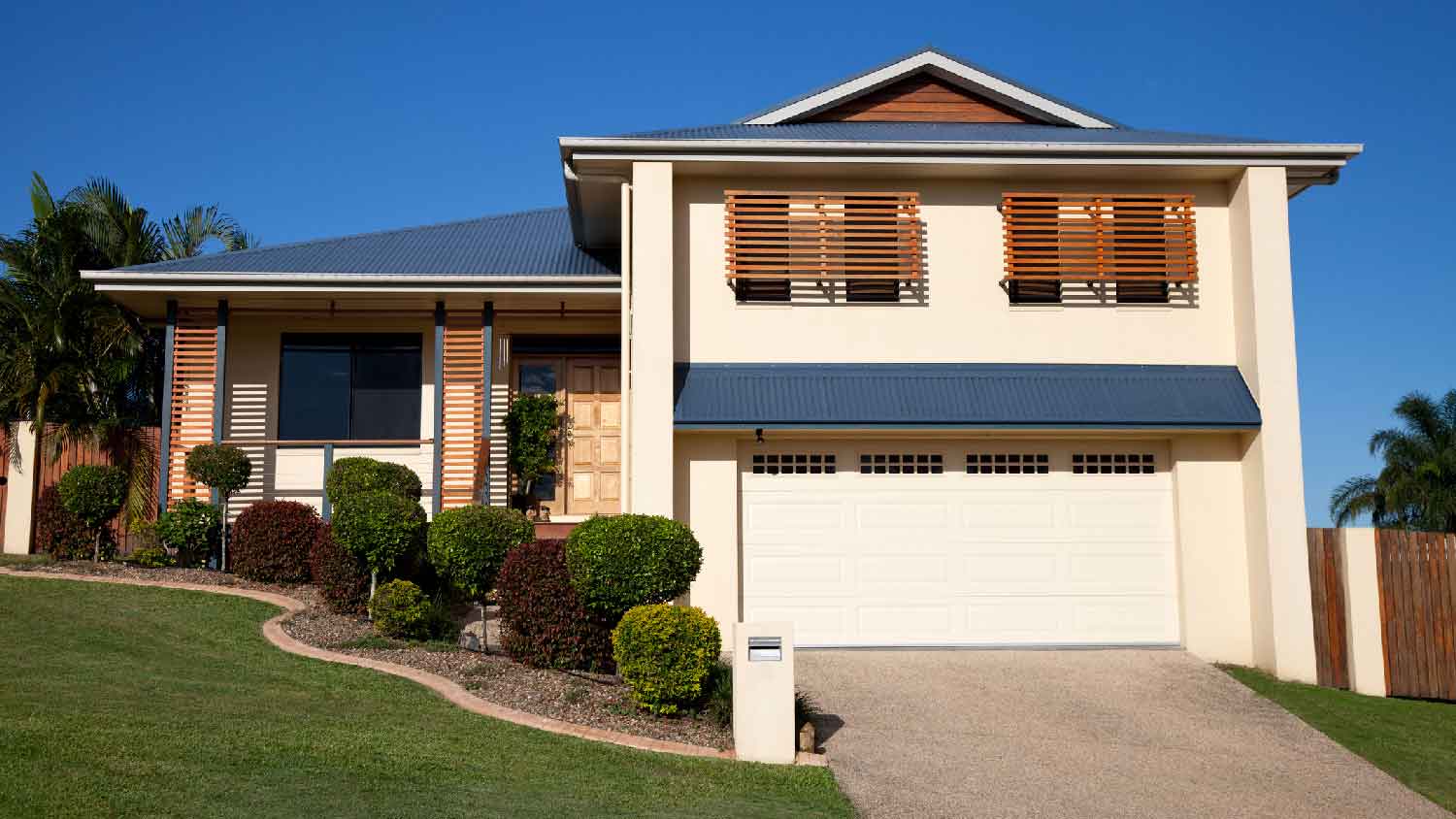
Use our guide to calculate the cost to seal an asphalt driveway. Prices vary based on the type of sealant and the size of the driveway.
Pave your path with asphalt or blacktop


Asphalt is a mix of aggregates—sand, gravel, and crushed stone—bound with bitumen, while blacktop is a type of asphalt with coarser stone.
Asphalt surfaces tend to be smooth, while blacktop shows rough, textured stone.
High-traffic areas typically use asphal,t while blacktop is common for driveways.
On average, the cost to install asphalt ranges between $7 and $13 per square foot.
Ever found yourself using “blacktop” when you really meant “asphalt?” You’re not alone. The two are often mistaken for each other, especially when you’re talking driveways, roads, and parking lots. Though they look similar, they’re actually not the same. And no, the difference isn’t just in the name. Let’s dive into what sets asphalt apart from blacktop so you can stop confusing the two—and sound like an expert while you’re at it.
It’s easy to mix up asphalt and blacktop. While they likely share more similarities than differences, they can be a bit more nuanced. Asphalt and blacktop are built for durability and budget-friendly projects, but when you dig a little deeper into how they’re made, where they’re used, and the way they age over time, you start to see where the lines are drawn. It’s not always obvious, but understanding the subtle differences can help you choose the right material for your next project.
| Type of Difference | Asphalt | Blacktop |
|---|---|---|
| Composition | Higher proportion of fine aggregates | Higher proportion of coarse aggregates |
| Appearance | Smoother, glossier surface | Rougher, more textured surface |
| Installation Location | High-traffic areas | Residential areas |
| Maintenance | Less maintenance | More maintenance |
| Durability | Slightly more durable | Slightly less durable |
| Lifespan | Similar lifespan to blacktop | Similar lifespan to asphalt |
| Cost | Slightly more expensive | Slightly less expensive |
Asphalt is a mix of aggregates—like crushed stone, sand, and gravel—bound together by bitumen, a sticky, black binding substance made from crude oil. Its composition can vary quite a bit, depending on the mix of aggregate sizes. Blacktop is a type of asphalt that refers to asphalt mixed with more coarse aggregates, like larger crushed stone. So when you see a “blacktop” surface, just know it’s a specific asphalt blend, often with coarser stone.

When you spot a freshly paved road, it’s easy to mistake the dark surface for the same thing every time, but asphalt and blacktop can look different, despite their similar compositions. Asphalt is a broad term, and its look can change depending on the mix. Some mixes, especially those with finer aggregates, create a smooth, almost glossy surface. It’s the kind you'd often find on highways and other high-traffic areas. On the other hand, blacktop is a type of asphalt that’s heavier on coarse aggregates. This makes its appearance rougher, with more of the individual stones showing. Its composition gives it a textured, slightly sparkly finish—that we sometimes see on driveways and in parking lots—especially when in direct sunlight.
The main difference when installing asphalt or blacktop is where they’re used. Asphalt is typically found in high-traffic areas like highways or large commercial lots, while blacktop is often seen on resident driveways. While installation for both is the same, the process involves specialized knowledge and equipment. First, the mix design requires the right blend and depends on factors like climate and traffic load. Then comes temperature control—keeping the mix at the right temperature ensures everything bonds correctly. From there, skilled professionals use specialized machines to lay down the material. While small repairs can be DIY-friendly, installing a solid asphalt or blacktop surface is a job best left to a professional asphalt company.
Maintaining asphalt and blacktop is pretty similar. Asphalt is typically more durable in the long run, but both surfaces need regular sealing to protect them from the sun, water damage, and freeze-thaw cycles. Blacktop is more prone to wear and tear, so it might need more frequent touch-ups. Sealing every two to three years is ideal for both, but the climate and traffic will affect this. As for crack repairs—don’t wait. Both surfaces need quick fixes to stop water from sneaking in. For homeowners, driveway cleaning and small crack repair can go a long way, but sealing and major fixes require professionals with the right tools and know-how for the job.
Asphalt is generally considered more durable than blacktop. Both asphalt and blacktop can handle heavy loads, making them ideal for everything from your driveway to highways. However, asphalt has more versatility. You can customize it with different aggregate mixes, which gives it an edge in durability. While blacktop is sturdy, asphalt’s ability to adapt to various environments (like high-traffic roads or colder climates) makes it more durable in the long run. Just be mindful of heat—both materials can soften under high temperatures, but asphalt is a bit more prone to rutting (permanent surface deformation from the wheels of heavy vehicles) in those conditions.

Asphalt is more about quality and care than the name you call it. Blacktop is just another term for asphalt that refers to a mix with coarser aggregates. Both asphalt and blacktop typically last 15 to 30 years if properly installed and maintained. Whether it’s called blacktop or asphalt, the longevity depends more on the mix design, installation, and maintenance than on the label. If the base isn’t solid, if the installation’s poor, or if cracks go unfixed, you’ll face repairs or replacement sooner rather than later.
The cost difference between asphalt and blacktop isn’t always clear-cut, mainly because people often use the terms interchangeably. That said, blacktop is generally a bit—and only slightly—more affordable. Asphalt is commonly used in more complex, high-traffic projects like highways, which means it requires stronger materials and more advanced installation methods. As a result, the cost to install asphalt ranges between $7 and $13 per square foot. Alternatively, blacktop is often used for residential jobs and doesn’t require as many high-end materials, making it the more budget-friendly option overall.
From average costs to expert advice, get all the answers you need to get your job done.

Use our guide to calculate the cost to seal an asphalt driveway. Prices vary based on the type of sealant and the size of the driveway.

Asphalt driveway repair costs account for everything from hairline cracks to complete overhauls. Learn what to expect from your asphalt repair bill.

Do you need more parking for your business or home? Here's everything you need to know about the cost to pave a parking lot.

Recycled asphalt is a less expensive, eco-friendly alternative to standard asphalt. Learn all about recycled asphalt driveways to see if it’s right for you.

You should not fill potholes in your driveway with mulch. Repair potholes with proper base material and then reseal.

With proper asphalt driveway maintenance, your home’s entrance should last around 25 years. This detailed guide will help you maximize your exterior investment.